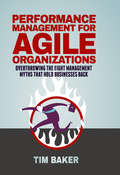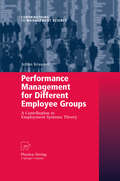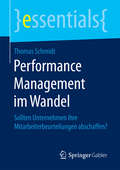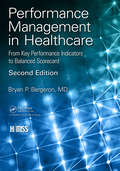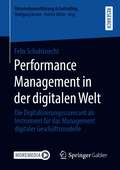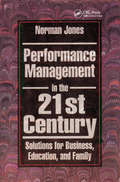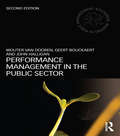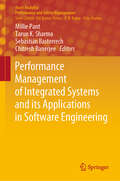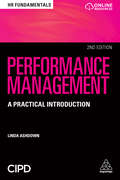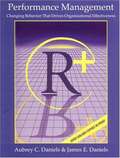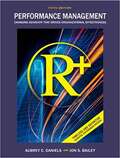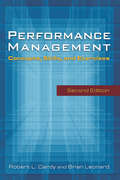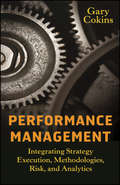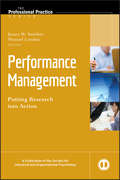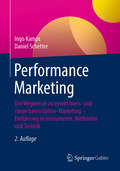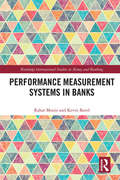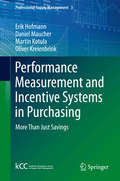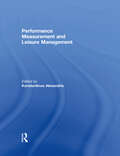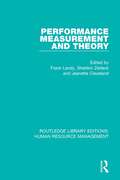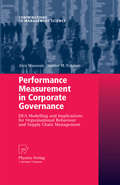- Table View
- List View
Performance Management for Agile Organizations
by Tim BakerBaker takes on eight dysfunctional people management practices originating from the scientific management and offers practical solutions for changing these practices and increasing organizational agility. Agile is the new black. Every business now has to be adaptive, nimble and ready to pivot - managers have to be comfortable with ambiguity and constantly ready for change. And yet. . . While agility is regarded as essential for competitive advantage, most organizations are still unthinkingly applying people management practices, rooted in Frederick Taylor's scientific management philosophy of the early 20th century, designed to ensure consistency and efficiency on production lines but which actively prevent the sort of creativity and flexibility needed in the modern workplace. 100 years of scientific management has led to the creation of eight performance myths. Myths that impede the agility necessary to compete in the age of the knowledge worker but which are so instinctively embedded in management psyche that they go unchallenged despite the fact that the changing world of work has rendered them dysfunctional and counterproductive. Through case studies and examples Baker demonstrates how the right workplace culture for promoting and applying agile decision-making consists of eight values shared by employer and employee - values that are polar opposite of the values and assumptions of traditional management styles. A new psychological contract that enables the collaborative working relationship necessary for agility to flourish.
Performance Management for Different Employee Groups
by Achim KrausertManage managers based on competencies and informal networks - Set task-based output goals for professional specialists - Control temporary workers at the agency level - Ensure that contractors are managed effectively as part of boundary-crossing networks. This book provides a framework of analysis to capture and explain differences in employment systems. Taking account of the wealth of research in the field, it provides a sound basis for developing function-specific performance management systems, integrating aspects such as incentivization, multi-source appraisal, and accountability. From macro to micro approaches of HRM, the contents will be of value to researchers on employment systems, strategic HRM, and occupational psychology and to practitioners of HRM and organizational development. Achim Krausert has been a consultant in the performance management group of Accenture, U.K. He obtained his D.B.A. from the University of Mannheim, Germany, and an M.Sc. and a B.Sc. from the London School of Economics.
Performance Management im Wandel: Sollten Unternehmen ihre Mitarbeiterbeurteilungen abschaffen? (essentials)
by Thomas SchmidtDas vorliegende essential befasst sich mit der Beurteilung von Mitarbeitern und gibt einen #65533;berblick #65533;ber den neuesten Stand von Forschung und Praxis. Dazu werden die Ergebnisse einer Befragung von 125 Unternehmen zum Thema ,,Mitarbeiterbeurteilung im Wandel" vorgestellt, die mit Unterst#65533;tzung der Frankfurt School of Finance & Management und der Deutschen Gesellschaft f#65533;r Personalf#65533;hrung (DGFP) durchgef#65533;hrt wurde. Wie kann man neue, innovative Performance-Management-Systeme einf#65533;hren? Wie schafft man Prozesse, die auf die Herausforderungen durch Digitalisierung und die Dynamisierung der globalen #65533;konomie eine Antwort geben? Dieses essential zeigt Wege dazu auf.
Performance Management in Healthcare: From Key Performance Indicators to Balanced Scorecard (HIMSS Book Series)
by Bryan P. BergeronPerformance management, often referred to as process management, is a strategy that can be used to achieve an optimum mix of quality, safety, patient satisfaction and solvency. The basis of performance management is the effective use of resources, as measured by quantifying processes and outcomes using key performance indicators (KPIs) – core measures that gauge the performance of an organization in particular areas. There is more to performance management than selecting a few KPIs from a list and feeding them into a graphical dashboard system. It’s about behavior change, leadership, and vision. Written for administrators, clinical staff, process improvement managers and information technology personnel of healthcare organizations, this second edition provides the knowledge necessary to provide the leadership and vision for a performance measurement initiative. This practical resource provides a high-level review of the quality/safety initiatives in healthcare, describes the implementation process from an IT perspective, and offers high-level clinical, financial and cultural details. It features an extensive listing of clinical and non-clinical KPIs: a glossary including financial, medical, and operational terms; and appendices of organizations and sources of indicators and benchmarks.
Performance Management in Healthcare: Improving Patient Outcomes, An Integrated Approach
by Jan Walburg Helen Bevan John Wilderspin Karin LemmensThis important new text demonstrates a step-by-step approach to understanding and improving performance management in healthcare organizations. It discusses the relevance of performance management to disease management and the professional development of the discipline, debates topical issues inherent in healthcare performance management, and includes case histories to assist in improving healthcare processes by making optimal use of tools and theories. It also investigates the application of the principles of the learning organization, performance management, and the theory and practice of quality management. Factors considered include: cost management and its implications transparency in healthcare results for all stakeholders information technology and its potential evaluation of feedback for further performance improvement. Combining case histories and examples with crucial theoretical framework, this book is invaluable reading for students of healthcare management, and all healthcare managers who strive to attain better care results.
Performance Management in Nonprofit Organizations: Global Perspectives (Routledge Studies in the Management of Voluntary and Non-Profit Organizations)
by Zahirul Hoque Lee ParkerWith increased competition for external funding, technological advancement, and public expectations for transparency, not-for-profit and non-governmental organizations are facing new challenges and pressures. While research has explored the roles of accounting, accountability, and performance management in nonprofit organizations, we still lack evidence on the best practices these organizations implement in the areas of accountability and performance management. This book collects and presents that evidence for the first time, offering insights to help nonprofits face these new challenges head-on. Performance Management in Nonprofit Organizations focuses on both conventional and contemporary issues facing nonprofits, presenting evidence-based insights from leading scholars in the field. Chapters examine the design, implementation, and working of accounting, accountability, governance, and performance management measures, providing both retrospective and contemporary views, as well as critical commentaries on accounting and performance related issues in nonprofit organizations The book's contributors also offer critical commentaries on the changing role of accounting and performance management in this sector. This research-based collection is an interesting and useful read for academics, practitioners, students, and consultants in nonprofit organizations, and is highly accessible to accounting and non-accounting audiences alike.
Performance Management in Retail and the Consumer Goods Industry: Best Practices and Case Studies
by Michael Buttkus Ralf EberenzThis book offers essential insights into various management concepts for retail and consumer packaged goods companies. Addressing a range of topics in the field of performance management, it presents concepts for management control, management reporting, planning & forecasting, as well as digitization-related aspects. The contributing authors share valuable lessons learned from real-world consulting projects and present innovative approaches to successful and effective management control at retail and consumer packaged goods companies.
Performance Management in der digitalen Welt: Die Digitalisierungsscorecard als Instrument für das Management digitaler Geschäftsmodelle (Unternehmensführung & Controlling)
by Felix SchuhknechtFelix Schuhknecht zeigt in diesem Buch, dass eine Notwendigkeit zur proaktiven und antizipativen Lenkung, Leitung und Gestaltung der digitalen Transformation von Geschäftsmodellen besteht. Um diese Aspekte ziel- und zweckorientiert erfüllen zu können, wird ein Performance Management benötigt. Aufgrund der Besonderheit digitaler Geschäftsmodelle zeigt sich allerdings, dass das bestehende Performance Management entsprechend adaptiert bzw. modifiziert werden sollte.Hierzu zeigt der Autor, dass der Grundgedanke der Balanced Scorecard eine sinnvolle konzeptionelle Basis darstellt. Diese ist allerdings entsprechend den Anforderungen digitaler Geschäftsmodellen zu modifizieren. So sollte beispielsweise das eher praxisorientierte Objectives and Key Results Management integriert werden.
Performance Management in the 21st Century: Solutions for Business, Education, and Family
by Norman JonesFulfilling the need for research on leadership, management, motivation, and human development, 21st Century Performance Management: Solutions for Business, Education, and the Family reveals how businesses and other institutions have suffered due to neglect of those skills.Based on concepts pioneered by longtime leadership specialist Dr. Jones 21st Century Performance Management: Solutions for Business, Education, and the Family tells how anyone in a supervisory capacity can help others become more highly motivated, more productive, and more successful in all walks of life.Features
Performance Management in the Public Sector (Masters in Public Management)
by John Halligan Geert Bouckaert Wouter Van DoorenIn times of rising expectations and decreasing resources for the public sector, performance management is high on the agenda. Increasingly, the value of the performance management systems themselves is under scrutiny, with more attention being paid to the effectiveness of performance management in practice. This new edition has been revised and updated to examine: performance in the context of current public management debates, including emerging discussions on the New Public Governance and neo-Weberianism; the many definitions of performance and how it has become one of the most contested agendas of public management; the so-called perverse effects of using performance indicators; the technicalities of performance measurement in a five step process: prioritising measurement, indicator development, data collection, analysis and reporting; and the future challenges and directions of performance management Performance Management in the Public Sector 2nd edition offers an approachable insight into a complex theme for practitioners and public management students alike.
Performance Management of Integrated Systems and its Applications in Software Engineering (Asset Analytics)
by Millie Pant Tarun K. Sharma Sebastián Basterrech Chitresh BanerjeeThis book presents a key solution for current and future technological issues, adopting an integrated system approach with a combination of software engineering applications. Focusing on how software dominates and influences the performance, reliability, maintainability and availability of complex integrated systems, it proposes a comprehensive method of improving the entire process. The book provides numerous qualitative and quantitative analyses and examples of varied systems to help readers understand and interpret the derived results and outcomes. In addition, it examines and reviews foundational work associated with decision and control systems for information systems, to inspire researchers and industry professionals to develop new and integrated foundations, theories, principles, and tools for information systems. It also offers guidance and suggests best practices for the research community and practitioners alike.The book’s twenty-two chapters examine and address current and future research topics in areas like vulnerability analysis, secured software requirements analysis, progressive models for planning and enhancing system efficiency, cloud computing, healthcare management, and integrating data-information-knowledge in decision-making. As such it enables organizations to adopt integrated approaches to system and software engineering, helping them implement technological advances and drive performance. This in turn provides actionable insights on each and every technical and managerial level so that timely action-based decisions can be taken to maintain a competitive edge. Featuring conceptual work and best practices in integrated systems and software engineering applications, this book is also a valuable resource for all researchers, graduate and undergraduate students, and management professionals with an interest in the fields of e-commerce, cloud computing, software engineering, software & system security and analysis, data-information-knowledge systems and integrated systems.
Performance Management: A Practical Introduction (HR Fundamentals #8)
by Linda AshdownEffective performance management is at the heart of organizational success, delivering able and motivated employees who are aligned to an organization's values and goals. Using a combination of case studies, interviews, tools and diagnostic questionnaires, Performance Management is a complete and practical guide to getting the best out of people and achieving positive organizational outcomes through successful performance management. It covers all areas of the subject, from objective-setting, giving feedback, measuring performance and managing underperformance and absence, to effectively integrating systems and processes into organizational and HR strategies.This second edition of Performance Management contains new material on the ethical focus of the topic, promoting employee wellbeing through performance management, and the future of the annual appraisal, as well as new case studies and examples from Deloitte, Jumeirah Hotels, the CIPD and Hilton. Supporting online resources consist of additional activities and guidance for further research on the topic.HR Fundamentals is a series of succinct, practical guides for students and those in the early stages of their HR careers. They are endorsed by the Chartered Institute of Personnel and Development (CIPD), the UK professional body for HR and people development, which has over 145,000 members worldwide.
Performance Management: Changing Behavior That Drives Organizational Effectiveness (4th Edition, Revised)
by Aubrey C. Daniels James E. DanielsPerformance Management offers strategies gained through ongoing research and successful PM applications in businesses and industries around the world. Since the 1989 publication of the third edition of this book, both scientists and practitioners have made continual advances in behavior-based performance enhancement. Dr. Aubrey C. Daniels and James E. Daniels now share those innovations and insights in a reorganized and expanded text. The upgraded material * conveniently divided into the two sections of Theory and Application * includes new chapters aimed specifically at addressing workplace performance issues: The Science of Behavior in Business* Being a Proactive Manager* Separating Behavior from Non-Behavior * Evaluating Performance Change * Finding and Creating Reinforcers * Delivering Reinforcers Learn to:Recognize the observable effects of positive and negative reinforcement, punishment, and penalty in the work environment. Optimally employ positive consequences to inspire discretionary effort? from any member of your organization. Design training, verbal instruction, and other antecedents to clearly communicate required and desired workplace behaviors. Eliminate negative evaluation processes after reading ?The 10 Top Reasons Why Traditional Performance Appraisals Produce Little Value to Organizations. If you've read a previous edition of this book, here are some of the updates you can expect in this new version. Performance Management, 4th edition is updated in terms of research and practice over the last twenty years. is organized into three helpful sections; Theory, Application and Implementation. has several new chapters. The most notable are two in the Theory Section on Behavior. There are also new chapters on evaluating performance change and planning reinforcement. has twice as many references, reflecting the additional research included. has more cartoons to add more R+ to your reading! is generally updated in examples and language. The basic concepts in this book are the same as in previous editions, although some concepts have been added (i. e. Establishing Operations) and the terminology has been updated to be more consistent with current research.
Performance Management: Changing Behavior That Drives Organizational Performance
by Jon S. Bailey Aubrey D. DanielsEven though this book in one edition or another has been in existence for 32 years, the use of behavior technology in the workplace is still in its infancy. Since the fundamental laws of behavior don't change, those who learn to apply this technology successfully, will have a clear performance advantage over those who don't.
Performance Management: Concepts, Skills and Exercises (Human Resource Management Ser.)
by Robert Cardy Brian LeonardThis comprehensive text provides an engaging examination of the entire process of performance management. It balances concepts with practical skill-based exercises, and gives readers both an understanding of performance management and the ability to manage performance. An online Instructor's Manual is available to adopters, and free PPTs are available through the author's website.
Performance Management: Integrating Strategy Execution, Methodologies, Risk, and Analytics
by Gary Cokins<p>An organizational transformation has taken place, in which the source for every organization's return on financial spending is shifting from tangible assets, like equipment, to intangible assets, like information and its people. But transforming an organization is much like having heart surgery while running a marathon without a finish line. <p>Written by Gary Cokins, one of the most well-known gurus of performance management, Performance Management: Integrating Strategy Execution, Methodologies, Risk, and Analytics is your finish line! <p>Beginning with a tongue-in-cheek description of how not to pursue a performance management culture, this big-picture book clarifies what performance management really is, what it does, how it enables better decisions and how to make it work. Revealing the relevant aspects of performance management, it discusses why integration of multiple management methodologies and behavioral change management are crucial to overcome managers and employees' natural resistance to change.</p>
Performance Management: Measure and Improve the Effectiveness of Your Employees (Harvard Business Essentials)
by Harvard Business School Press StaffToday's competitive workplace demands that managers evaluate employee performance, and provide coaching. Performance Management will help managers prepare for a formal performance meeting with a direct report, and create a development plan to increase employee productivity. The Harvard Business Essentials series is designed to provide comprehensive advice, personal coaching, background information, and guidance on the most relevant topics in business. Whether you are a new manager seeking to expand your skills or a seasoned professional looking to broaden your knowledge base, these solution-oriented books put reliable answers at your fingertips.
Performance Management: Path to Growth and Excellence
by T. V. Rao Nandini ChawlaThis book attempts to shift focus from performance appraisals to performance management incorporating performance planning, analysis, and development as critical components of it. The performance management system (PMS) is a future-driven exercise rather than merely a past-reviewing exercise. Performance management is treated as a year-round practice and not an appraisal process conducted once a quarter or annually. Moreover, it is now considered to be everyone’s responsibility and not merely that of HR or the upper management.This book advocates the structuring of PMSs and their implementation. It incorporates the most modern 360-degree feedback systems and shows the ways and means of integrating it into PMS. Arguments are offered to use rating-less appraisals and/or a combination of appraisals with 360-degree feedback. It defines performance management to mean continuous improvements in performance of individuals, their teams, departments, and corporations. It also outlines that planning, analysis, review, coaching, and capability building are essential building blocks for good performance management.Concise, lucid, and engaging, this volume would be useful to the students, researchers, and faculty of human resource management, organizational behaviour and applied psychology. It would also be an invaluable guidebook for practicing business executives and HR professionals to help them implement the performance management system for effective talent management leading to increased productivity.
Performance Management: Putting Research into Action (J-B SIOP Professional Practice Series #21)
by Manuel London James W. SmitherThere has been a shift in HR from performance appraisal to performance management. A new volume in the SIOP Professional Practice Series, this book contains a broad range of performance management topics, offers recommendations grounded in research, and many examples from a variety of organizations. In addition to offering state-of-the-art descriptions of performance management needs and solutions, this book provides empirical bases for recommendations, demonstrates how performance management tracks and helps promote organizational change, and exams critical issues. This book makes an ideal resource for I/O psychologists, HR professionals, and consultants."In this comprehensive and timely volume, Smither and London assemble an exceptional collection of chapters on topics spanning the entire performance management process. Written by leading researchers and practitioners in the field, these chapters draw on years of research and offer a blueprint for implementing effective performance management systems in organizations. This volume is a 'must-read' for all those interested in performance management."--John W. Fleenor, Ph.D., research director, Center for Creative Leadership
Performance Marketing: Der Wegweiser zu einem mess- und steuerbaren Online-Marketing – Einführung in Instrumente, Methoden und Technik
by Ingo Kamps Daniel SchetterAus dem Inhalt:Teil I - Einführung: Meilensteine in der Entwicklung des Performance-MarketingTeil II - Performance-Marketing-Kanäle: Suchmaschinen-Optimierung.- Suchmaschinen-Werbung (SEA).- E-Mail-Marketing.- Display Advertising.- Affiliate-Marketing.- Social-Media-Advertising.- Influencer Marketing.- Teil III - Auswertung & Analyse: Web-Analyse (Web-Analytics).- TV-Tracking.- Teil IV – Spezialfälle: Mobile Marketing.- Amazon-Optimierung.- Preissuchmaschinen .- Teil V – Technologie: Data-Management-Plattform (DMP).- Adblocker.- Teil VI - Tipps & Tricks: Google AdWords vs. Facebook Ads.- In-House vs. Agenturen.- Betrug im Performance-Marketing.- Teil VII – Ausblick: Zukunft des Performance-MarketingsDieses Buch beschreibt leicht verständlich, welche Instrumente das Performance-Marketing bietet, wie sie erfolgreich eingesetzt und kontinuierlich optimiert werden können. Das Ergebnis ist ein vollständiger und praxisnaher Ratgeber für den erfolgreichen Start ins Performance-Marketing.Noch nie standen so viele Tools und Daten zur Verfügung, um dem Erfolg der eigenen Werbung auf die Spur zu kommen, Streuverluste zu vermeiden und passende Neukunden zu finden. Doch diese Vielzahl der Online-Marketing-Tools ist nicht nur ein Segen, neue Technologien bergen auch Risiken. Die Autoren bieten konkrete Hilfe: Sie schaffen einen Überblick über die wichtigsten Performance-Marketing-Instrumente und zeigen, worauf es beim Einsatz ankommt – bis hin zur Erkennung und Vermeidung von Betrugsversuchen.Die zweite Auflage ist vollständig überarbeitet mit Updates u.a. zum Datenschutz, Künstliche Intelligenz und technischen Neuerungen bei Google, Amazon & Co sowie neuen Kanälen wie z.B. Tik Tok.Gastbeiträge von und Interviews mit: Felix Beilharz (felixbeilharz.de)Marco Brenn (InBiz Online Marketing GmbH & Co. KG)Melina Hoischen (Kalilopii.de)Mario Jung (OMT.de)Markus Kellermann (xpose360)André Koegler (easy Marketing GmbH)Thore Ladicke (Facebook)Paul Niemeyer (Resolution Media)Marcus Pentzek (Searchmetrics)Martin Pichler (gutefrage.net GmbH)Christian Schmidt (Axel Springer Teaser Ad GmbH)Martin Sinner (Gründer idealo.de)Alexandra Streufert (Facebook) Professor Dr. Christian Stummeyer (Technische Hochschule Ingolstadt)Marcus Tandler (Ryte GmbH)Philipp Westermeyer (Online Marketing Rockstars)Markus Wigbels (easy Marketing GmbH)
Performance Measurement Systems in Banks (Routledge International Studies in Money and Banking)
by Rahat Munir Kevin BairdGiven the significant changes in the banking environment and the resultant pressures on banks to change their systems and procedures, this book is a timely reference that provides a comprehensive analytical overview of changes in the performance measurement system (PMS) of banks in the post-financial crisis era. It explores the factors that influence such changes and examines banks’ consequential responses to institutional pressures. It is an invaluable resource for researchers and practitioners to gain insights into the concept of PMS change in both developed and developing economies.
Performance Measurement and Incentive Systems in Purchasing
by Erik Hofmann Daniel Maucher Martin Kotula Oliver KreienbrinkIn recent years, purchasing performance measurement have steadily gained in importance in theory and practice. Yet, in many cases, the focus still remains on cost items, especially savings. Moreover, reported performance ratios in purchasing are frequently called into question in terms of their amount and efficacy. Most of the time, there is no tie-in at all with staff compensations. To meet these and other challenges, this book presents a holistic approach for purchasing performance measurement and the incentive systems associated with it. The following topics are dealt with in detail: * Purchasing performance measurement on the level of commodity groups and the procurement organization * Supplier evaluation and performance measurement on the level of the buyer-supplier relationship * Comprehensive systems for purchasing performance measurement, such as the procurement value added and the purchasing balanced scorecard * Performance-oriented incentive systems and bonus payments for buyers, procurement organizations and suppliers Readers are thus provided with comprehensive guidelines for the implementation and realization of sustained performance measurement and incentivization in purchasing.
Performance Measurement and Leisure Management
by Konstantinos AlexandrisThe issue of performance measurement in the leisure industry is increasingly important, from both theoretical (academic) and applied (practitioner) perspectives. Managers need accurate indications of how their organisations are performing, to inform their decisions. Policymakers need an evidence base for their decisions regarding public leisure services. Students and researchers in leisure management are increasingly turning their attention to the principles and evidence of performance measurement, as an aid to management decision-making.The chapters in this text each present a different case study of performance measurement. They cover a wide range of sectors in the leisure industry including public recreation centres, theme parks, play facilities, sport organisations, hospitality, and the Olympic Games. The evidence from these cases covers examples from three different continents and five different countries.All the chapters report empirical research and all the cases explore managerial implications. However, results are presented with clearly explained statistical analysis, which can be easily understood by a non-academic audience. The book will be useful for leisure management students, researchers and practitioners. The chapters provide both reviews of the relevant literature and propose new measurement models based on original data.This book was previously published as a special issue of Managing Leisure.
Performance Measurement and Theory (Routledge Library Editions: Human Resource Management)
by Sheldon Zedeck Frank Landy Jeanette ClevelandIn this volume, first published in 1983, the editors aim to achieve an understanding of performance from a variety of theoretical perspectives. The papers in this volume will not only spur further research, but will also provide an opportunity for some careful considerations of how performance is measured in various applied settings. The book is divided into four major areas; intraindividual issues, interdividual/organizational dynamics, methodology, and philosophies. This title will be of interest to students of business studies, psychology and human resource management.
Performance Measurement in Corporate Governance: DEA Modelling and Implications for Organisational Behaviour and Supply Chain Management
by Sardar M. Islam Alex ManzoniIn the global knowledge economy, corporate governance, organisational behaviour and performance of the supply chain are becoming increasingly important aspects of the evaluation of an enterprise. The subject of this book is the development of a contemporary organisation behaviour performance measurement (OBPM) model for enterprises in the modern economy. The fields of organisation behaviour and supply chain management are integrated with an Open Socio-Technical Systems theory of management and the application of Operations Research to corporate governance for the measurement of organisation performance. This book thereby offers a new and innovative quantitative approach to qualitative concepts of corporate performance measurement and makes a significant contribution to the fields of management theory, supply chain management as well as operations research.
